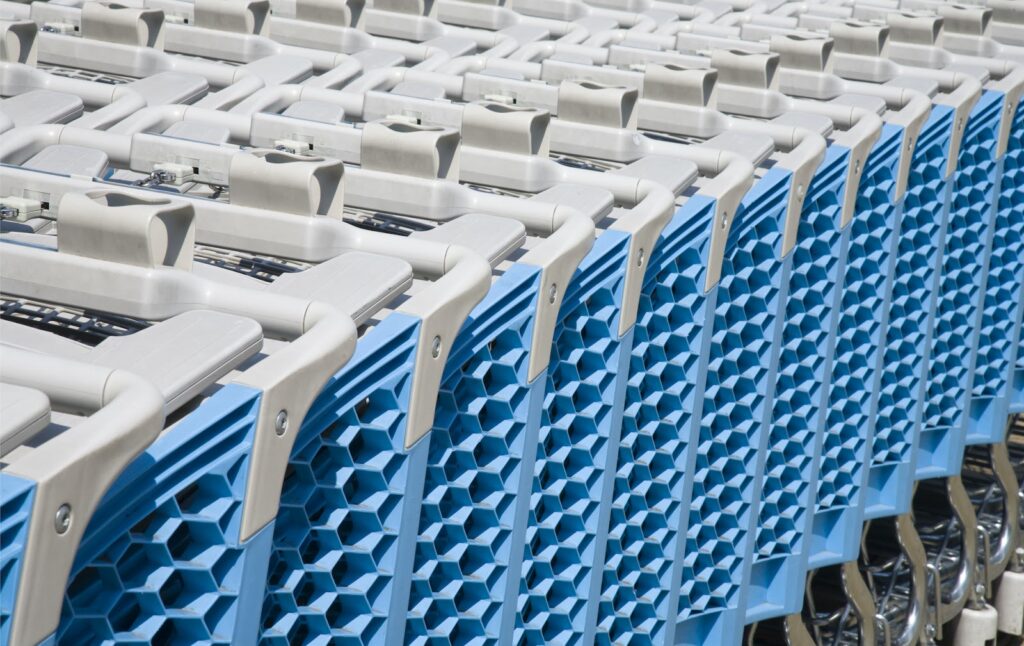Blog, Plastic Shopping Carts, Shopping Carts, Specialty Carts, Wire Shopping Carts
Pros and Cons: Plastic Shopping Carts
There are many factors to consider before purchasing new shopping carts for your store, such as how many you’ll need, how you’ll store them, where they’re manufactured, how big or small they should be, and more. But a more fundamental question underlies all of these other considerations: what are your shopping carts made of?
Generally speaking, shopping carts are either built from plastic, metal, or some combination of these materials. Despite the frequent overlap between cart composition, shopping carts fall into two main categories: wire and plastic. This distinction primarily refers to the composition of the cart’s basket component, since most carts feature metal casters, hardware, and other structural parts. Simply put, then, wire shopping carts refer to carts with metal baskets while plastic carts refer to carts with plastic baskets.
In a previous blog, “Plastic vs. Wire Shopping Cart: Which Is Best for You?”, we went over some of the main functional and aesthetic similarities and differences between these two types of carts. Here, we’ll dive deeper into the pros and cons of plastic shopping carts in particular.
Pros of Plastic Shopping Carts
In today’s increasingly eco-conscious world, plastic has become somewhat of a dirty word. However, there are plenty of reasons to pick plastic carts over wire carts for your store. Here’s why.
Highly Customizable
The functionality of shopping carts goes beyond their carrying capacity and mobility — your carts can also serve to reinforce your brand identity and enhance your location’s atmosphere. In order to get the most out of your carts, then, you must consider their color and design. While wire carts may offer some options in this arena, plastic shopping carts are much more customizable. With plastic carts, you can select from a variety of colors and even have your business’s logo attached to or stamped onto the basket so customers and passersby recognize your brand.
Quiet and Comfortable
Minimizing noise is paramount for retaining customers and maintaining an inviting store atmosphere for everyone. While both wire and plastic shopping carts can emit loud noises in specific circumstances, plastic carts tend to be quieter by virtue of plastic’s composition because sound waves vibrate much more easily through metal surfaces than plastic ones. So, even if a wire and plastic cart both have a squeaky wheel, the sound is likely to carry further through the wire cart than it would through the plastic one — indeed, plastic carts sometimes dampen otherwise obnoxious sounds.
Built to Last
Heavy duty shopping carts come in all shapes, sizes, and compositions — when properly manufactured both plastic and wire shopping carts offer high durability. However, plastic carts tend to stand the test of time better than wire carts. For one thing, the plastic used for plastic carts is typically thicker than the metal used for wire carts, so it’s easier to bend and otherwise damage a metal cart than it is a plastic one. Additionally, metal materials are susceptible to oxidation (rusting) — plastic takes a much longer time to deteriorate via natural processes.
Not as Dangerous or Destructive as Wire Carts
Finally, plastic shopping carts won’t do as much damage as wire carts if they run into aisles, vehicles, or other people. In this way, plastic carts are less of a liability for your business.
Cons of Plastic Shopping Carts
Despite their many advantages, plastic carts come with a few key caveats as well. Let’s go over them now.
Slightly Heavier Than Wire Carts
The weight of a given shopping cart is primarily determined by its composition. Generally speaking, plastic carts tend to weigh a bit more than wire carts of a similar size and shape, though this varies depending on the manufacturer and the materials used. Weight might not seem like a major issue regarding shopping carts (they’re on wheels, after all), but heavier carts can diminish the customer experience and put extra strain on employees tasked with returning carts.
Difficult to Repair When Necessary
Though plastic carts don’t break down as easily as wire carts, in the event that a plastic cart does get damaged, it can be difficult and expensive to repair the problem. On the other hand, repairing wire carts is often a matter of simply replacing a part.
Typically More Expensive Than Wire Carts
When it comes to buying shopping carts for your business, you don’t want to break the bank. Unfortunately, plastic carts tend to cost a bit more than wire carts. That said, plastic carts might last longer than metal ones, so this equation becomes a matter of short-term vs. long-term thinking. If you absolutely need to keep costs low in the short-run, however, wire carts might be the better choice.
Are Plastic Shopping Carts Right for Your Store?
There’s a lot to like about plastic shopping carts — they’re easy to customize, not too noisy, extremely durable, and minimally destructive. If you can get over the fact that these carts might be on the heavier side, difficult to fix, and pricey when compared to wire options, then plastic might be perfect for your needs. Either way, at Good L Corporation, we manufacture both plastic and wire shopping carts, and we’re happy to help you choose the best shopping carts (and baskets) for your business.Good L Corporation delivers innovative shopping cart and basket solutions for retailers on a global scale. From a fleet of new custom carts to launch your store opening, to replacement baskets that supplement your existing shop supply, Good L Corp can configure the right carryall strategy to boost your retail business. Let’s get started! Contact us today for a no-pressure sales quote.


Request a Quote
Get a boost to your impulse sales which ultimately leads to an overall improvement of your total sales. Don’t you want to increase sales? Of course you do!